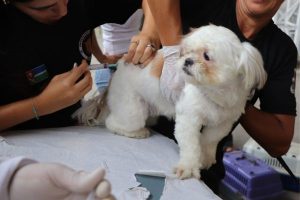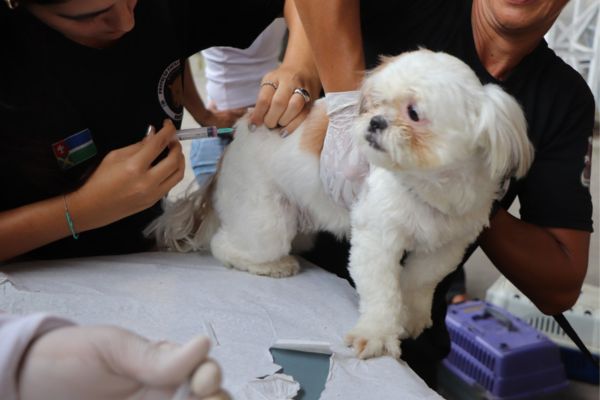
Since January, ABC has been mobilizing for the animal cause through rabies vaccination campaigns, to prevent rabies. As Orange August approaches, the month dedicated to the fight against zoonoses, the region has registered 8,784 vaccinated animals, 5.5% less than in the first half of 2023, with 9,302 animals out of 18,604 pets vaccinated during the year. Despite no recorded cases of rabies, the region remains on alert and hopes to vaccinate at least 14,000 pets by December.
Santo André ABC leads in the number of animals vaccinated against rabies, with 2,839 doses administered in 2024, and 6,661 in 2023. With 7,000 doses expected by the end of the year, rabies vaccination is now available to residents in the routine operation of the Department of Zoonotic Disease Control. Just go to Rua Igarapava 239, in Vila Valparaíso, from Monday to Friday, from 8 a.m. to 5 p.m. For questions and guidance, just contact us by phone (11) 3356-9075.
Next comes the city of São Bernardo, which vaccinated 1,599 pets between January and June of this year. In the same period in 2023, the City Hall administered 2,447 doses, and now aims to reach 3,200 doses by the end of the year. The municipality's Zoonotic Disease Control Center performs routine rabies vaccinations on a permanent basis on Mondays and Wednesdays, from 9 a.m. to 4 p.m., by prior appointment via telephone: (11) 4365-3349 and (11) 4367-3306 or via WhatsApp (11) 99226-4555.
Sao Caetano
With 1,266 animals vaccinated, São Caetano expects to administer 2,200 doses of the vaccine to pets this year. Currently, vaccinations are carried out periodically every Friday in different areas of the city. To be vaccinated, residents simply need to bring their pets and proof of the latest rabies vaccination, if available. For the following locations and schedules, simply contact us by phone at (11) 4231-3938.
Rio Grande da Serra vaccinated 572 animals in 2023, and between January and June of this year, it has already administered 1,197 doses of rabies vaccine, with 1,500 expected by December. The municipality is not currently running an active campaign, but is implementing Vaccination from Monday to Friday, from 8 a.m. to 12 p.m., at the Center for the Control of Zoonoses, at Dr. Roy Trindade Street, 177, in Parque America. More information by phone (11) 2770-0205.
In Ribeirão Pires, 930 pets were vaccinated this year compared to 2,500 in 2023. As in all cities, vaccination is free. This year, the City Hall has adopted the routine service in the central square of Vila do Doce, which always takes place on the last Saturday of each month with the Dog and Cat Adoption Fair, as well as the CCZ, on Catarina Rios Giachelo Street. 185, Jardim Bois Sorte. Vaccination is done by appointment by phone (11) 4824-3748 to submit the application on Mondays, Wednesdays and Fridays.
This year, Mauá Foundation has carried out rabies vaccinations for 842 animals, a service that is always carried out on request, on the last Thursday of each month with an appointment by phone. (11) 4512-7499 (extension 1530 or 1662, at the Animal Protection Center (Rua Almirante Tamandaré, 191 – Vila Bocaina). In 2023, the city was registered 1,934 animals vaccinated.
In Diadema, in the first semester, 111 pets were vaccinated against rabies. 2438 in the whole year 2023. Residents always vaccinate their dogs and cats the first week of each month, Monday and Wednesday, from 9 a.m. to 12 p.m. and from 1 p.m. to 4 p.m., at the Zoonotic Disease Surveillance Unit, located at Rua Capilla, 380, Inamar neighborhood. Pets older than three months are vaccinated, except for pregnant females or those suspected of being infected, and animals being treated for diseases or very weak.
Vaccinated Animal Falls and the Importance of Prevention
Rabies is a serious, contagious viral disease of mammals, including humans, with a case fatality rate of approximately 100%. Transmission to humans occurs primarily through the saliva of infected animals, or through bites, scratches, or licks from a sick animal.
Since 2021, the state of São Paulo has suspended rabies vaccination campaigns due to the lack of records of zoonotic cases. From 1999 to 2017, Brazil recorded 1,200 positive cases of rabies. From 2017 to 2021, there were only 11 types and all of them were identified as wild animal variants. For biologist and former deputy minister of animals in Ribeirão Pires, Marcos Lepp, this could be the reason behind the low number of vaccinated dogs and cats.
As an animal activist in Ribeirão Pires, Leib comments that the city has never stopped rabies vaccination, and has maintained it as a routine vaccination with veterinary health professionals, in parallel with other animal welfare measures. “Given the risk of rabies transmission, vaccination must be reinforced annually, along with the multi-purpose vaccine, to prevent other diseases, in addition to rabies,” he says.

“Wannabe internet buff. Future teen idol. Hardcore zombie guru. Gamer. Avid creator. Entrepreneur. Bacon ninja.”


